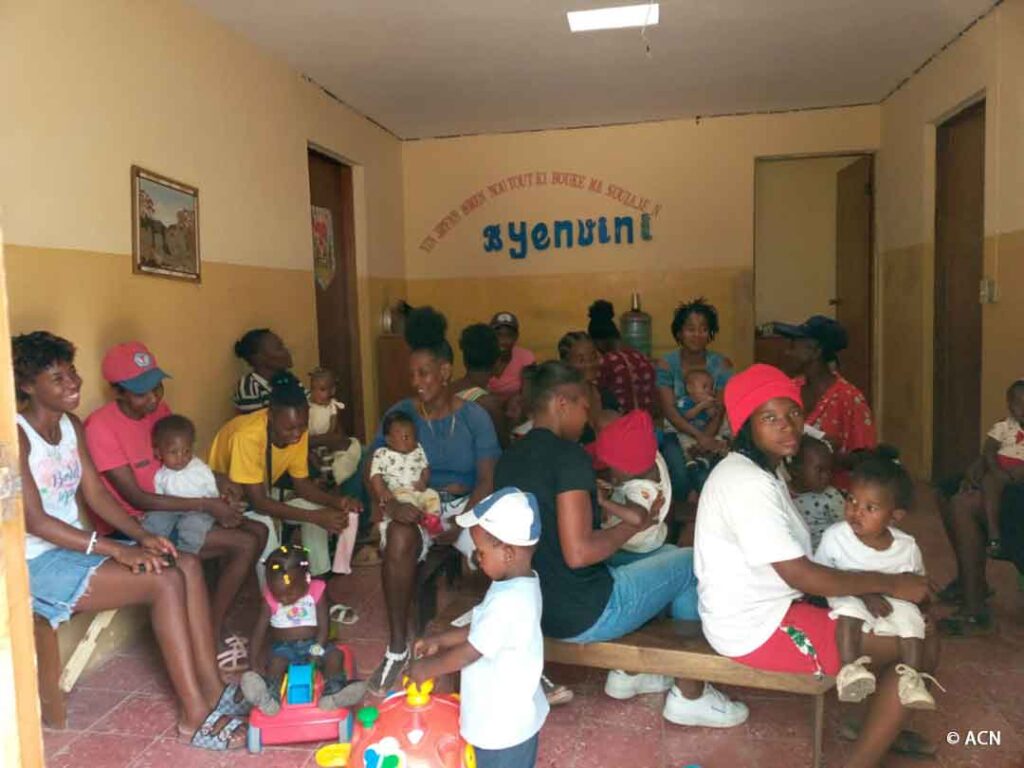Haiti: “The people are suffering; everyone is at risk”
Sister Helena Queijo spent nine years in one of the most dangerous countries in the world, where armed gangs run rampant and even clergy and religious are under constant threat.
A religious sister who spent most of the past decade in Haiti has spoken to Aid to the Church in Need (ACN) about the plight of the ordinary people who are subjected to daily chaos and violence in the Caribbean nation.
Sister Helena Queijo returned to her native Portugal two weeks ago to look after her ageing parents, after spending nine years in the Spiritan mission in the Diocese of Jacmel, Haiti. Though relatively safe, the rural area where she served saw a steady stream of displaced people fleeing the violence that has overcome major cities, including the capital, Port-au-Prince.

“The people are suffering greatly. They might be in their homes in the capital and the bandits come and force them out. If they are lucky, they won’t kill them, but they have to flee and remain hidden for a long time. Many people have lost their property and their homes,” the sister told ACN.
Sister Helena recalls that when she arrived in Haiti, in 2016, the country had no head of state, and now, when she left, it is in the same situation. “In the history of Haiti, most of the presidents were murdered, this violence is not new,” she says. However, the situation has deteriorated dramatically in the past few years, with armed gangs controlling most of the capital and many major cities. At the beginning of April, a gang rampaged through the city of Mirebalais, killing dozens of people, including two religious sisters. “I didn’t know the sisters personally, but God have mercy on these people,” the sister says.
Kidnappings are also a constant threat. “They don’t only kidnap foreigners or priests and religious, they will kidnap the simple people as well. Everyone is at risk due to the insecurity and instability; nobody is free from the risk of being robbed and kidnapped. All they want is money.”

Although she managed to remain in Haiti unscathed, many Church institutions in the country were also badly affected by the violence. “Schools have been invaded by gangs, as was the Church’s hospital and the school and residence of the Spiritans in Port-au-Prince. The Saint Francis of Sales Hospital was attacked and the sisters were forced to remove their habits so that they could hide among the general population and escape. Even the Missionaries of Charity, who do so much for the people, had to evacuate their patients and leave,” Sister Helena tells ACN.
As the situation worsened in Port-au-Prince, the Spiritans in Jacmel began to notice an influx of internally displaced people fleeing the violence. “The area where our mission is located remains calm for now, though some bandits who are being chased by the police in the bigger cities are trying to escape there. But the police are active, and they have warned the population to be on the alert, to detect anybody suspicious. I spent all my nine years in the mountains, but when we do have to go to the city there is always fear, though we know we are in God’s hands.”
Jacmel is a rural area, where people depend on subsistence farming. There is no running water, sewage system or electricity, and fuel is often in short supply. The Spiritans have solar panels, which allows them to operate some electrical appliances, like a refrigerator, so that they can preserve some food.

The arrival of internally displaced people puts further stress on this fragile system. “If the rain doesn’t come, we begin to see that the people go hungry, and they come to us for help. They ask for a little rice or some beans. And we never let them go away empty-handed, even if we can only provide a little, because we can’t give them everything they need, since we have to share with others,” the religious sister explains.
ACN has been supporting the Church in the Diocese of Jacmel for more than 30 years, with around 25 projects in the past five years alone. These include mass stipends for priests and help for religious sisters, as well as support for the formation of seminarians, religious, catechists and laypeople, help for young people, formation courses on human rights for Pastoral leaders and transport, which is crucial to reach remote areas in the diocese.


